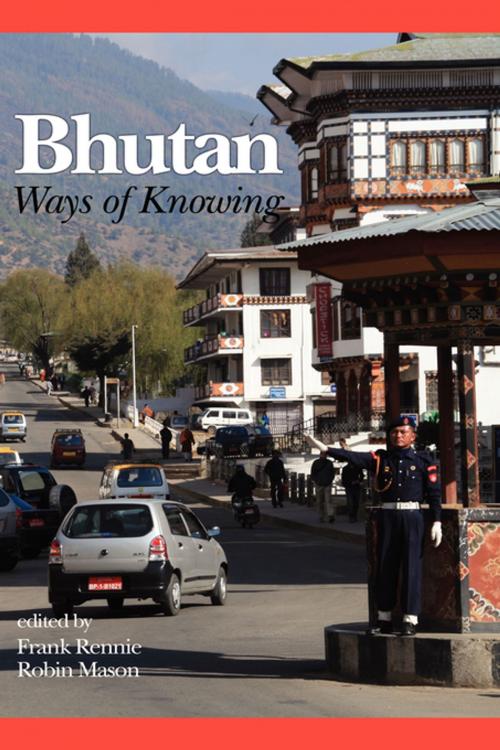Bhutan
Ways of Knowing
Nonfiction, History, Asian, India, Reference & Language, Education & Teaching, Higher Education| Author: | ISBN: | 9781607528241 | |
| Publisher: | Information Age Publishing | Publication: | December 1, 2008 |
| Imprint: | Information Age Publishing | Language: | English |
| Author: | |
| ISBN: | 9781607528241 |
| Publisher: | Information Age Publishing |
| Publication: | December 1, 2008 |
| Imprint: | Information Age Publishing |
| Language: | English |
There is a mistyeyed vision of Bhutan which has popularized it as ‘the last Shangrila’, the hidden Himalayan jewel, the travel destination of celebrities and uniqueexperiencehunters. We are not entirely comfortable with this image. Bhutan has undoubtedly become the focus of considerable media attention in the last few years. Articles appear regularly on its substitution of happiness for money as the indicator of the country’s wealth. Television programs, books, visits by personalities all have served to bring Bhutan to global awareness. This attention only serves to increase pressure on the culture to become like any other. How has Bhutan resisted the impact of globalisation which has had such a homogenizing affect on most other countries in the world? A practice, until recently, of selfimposed isolation from the rest of the world, the Buddhist tradition, and the lack of any successful foreign invader have combined to produce a living culture that is as unique as it is fragile. This fragility suggested the need to document a context that seemed on the verge of change. Our second visit in 2008 confirmed our sense of immanent change, as we could see for ourselves the ways in which ‘international culture’ was beginning to appear: the first escalator in the country, widening the main road from single track to dual carriageway, the first democratic election, the availability of satellite television, and internet expansion... Nevertheless, we continue to feel that in Bhutan there is a different ‘way of knowing.’ We have worked with staff at the University to try to capture something of this in three different forms: • chapters written by Bhutanese individuals about the culture, landscape, education and folklore • extracts from interviews with university staff and associates to draw out particular characteristics of Bhutan which would be of interest to Western readers • photographs of Bhutan which provide a different ‘view’ of the country to complement the text. The subject matter has been chosen by Bhutanese staff at the Royal University of Bhutan as an expression of their understanding of their own land. There are conventional travel books about Bhutan available and we have not attempted to contribute to this literature. Bhutan: Ways of Knowing is a book which reflects Bhutanese understanding of their country. We hope that you will find these contributions as interesting and thoughtprovoking as we do, and that you, too, will find a different way of knowing about Bhutan.
There is a mistyeyed vision of Bhutan which has popularized it as ‘the last Shangrila’, the hidden Himalayan jewel, the travel destination of celebrities and uniqueexperiencehunters. We are not entirely comfortable with this image. Bhutan has undoubtedly become the focus of considerable media attention in the last few years. Articles appear regularly on its substitution of happiness for money as the indicator of the country’s wealth. Television programs, books, visits by personalities all have served to bring Bhutan to global awareness. This attention only serves to increase pressure on the culture to become like any other. How has Bhutan resisted the impact of globalisation which has had such a homogenizing affect on most other countries in the world? A practice, until recently, of selfimposed isolation from the rest of the world, the Buddhist tradition, and the lack of any successful foreign invader have combined to produce a living culture that is as unique as it is fragile. This fragility suggested the need to document a context that seemed on the verge of change. Our second visit in 2008 confirmed our sense of immanent change, as we could see for ourselves the ways in which ‘international culture’ was beginning to appear: the first escalator in the country, widening the main road from single track to dual carriageway, the first democratic election, the availability of satellite television, and internet expansion... Nevertheless, we continue to feel that in Bhutan there is a different ‘way of knowing.’ We have worked with staff at the University to try to capture something of this in three different forms: • chapters written by Bhutanese individuals about the culture, landscape, education and folklore • extracts from interviews with university staff and associates to draw out particular characteristics of Bhutan which would be of interest to Western readers • photographs of Bhutan which provide a different ‘view’ of the country to complement the text. The subject matter has been chosen by Bhutanese staff at the Royal University of Bhutan as an expression of their understanding of their own land. There are conventional travel books about Bhutan available and we have not attempted to contribute to this literature. Bhutan: Ways of Knowing is a book which reflects Bhutanese understanding of their country. We hope that you will find these contributions as interesting and thoughtprovoking as we do, and that you, too, will find a different way of knowing about Bhutan.















